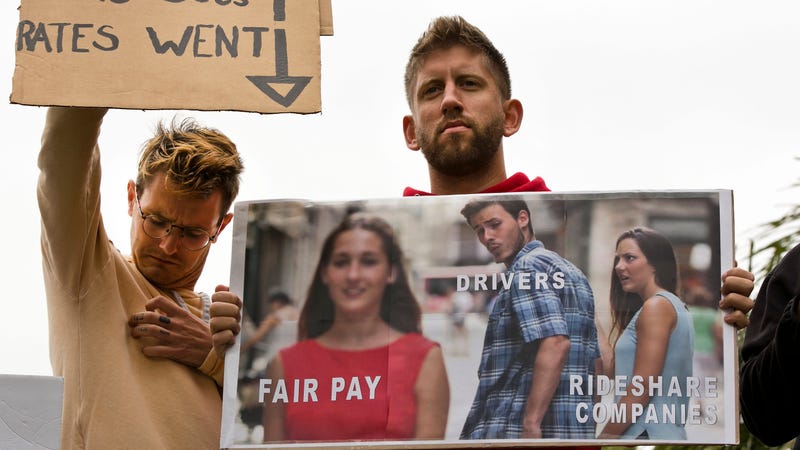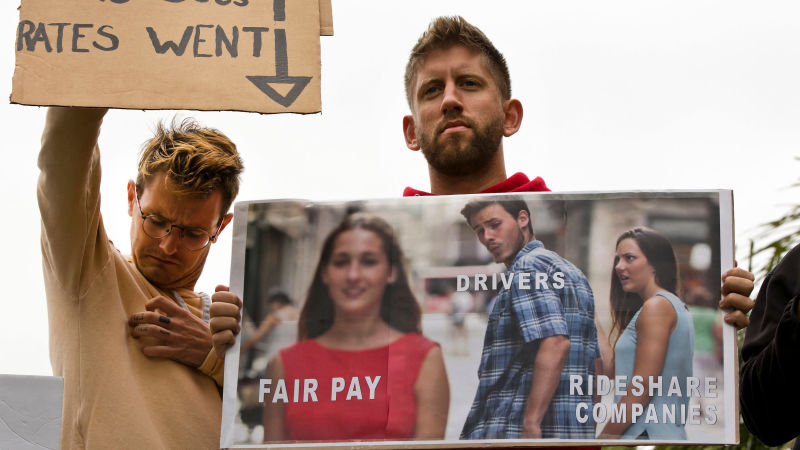
On October 23, an arbitrator will sit down in Uber’s New York office and hear arguments in a case that could determine the ride-hail giant’s future. It is not about the employment status of a single driver, but rather the very legality of Surge Pricing, Uber’s flagship feature that adjusts the price of rides according to supply and demand principles.
Advertisement
If the arbitrator rules against Uber, it could, in essence, make Surge Pricing illegal and, more broadly, call into question the legality of Uber’s entire business model of controlling the prices hundreds of thousands of independent contractors are permitted to charge.
“This has always been a simple case,” said Andy Schmidt, the lawyer who filed the original federal district court action back in late 2015. “Uber wants to have it both ways.”
And now, after almost four years, this “simple case” faces a big test. It’s the first time anyone is actually going to rule on whether Uber is violating the antitrust law.
The case, which originated as Meyer v. Kalanick in 2015, was indeed a simple one: Uber’s drivers are independent contractors, a legal distinction Uber views as central to its business model. Yet Uber also sets the price that all those independent contractors must charge for their businesses. When a bunch of independent businesses agree to charge the same price for a product or service, that is generally called price fixing, and price fixing is very much illegal under the Sherman Antitrust Act.
Advertisement
But, thanks to the arbitration clause in Uber’s terms and conditions, Judge Jed S. Rakoff was forced to kick the case to arbitration in 2017, a decision he made with little joy, wryly noting in a later ruling “This being the law, this judge must enforce it—even if it is based on nothing but factual and legal fictions.”
Yet, in March 2018, Rakoff made a far more more important ruling. Rakoff denied Uber’s motion to dismiss Meyer’s claims for “declaratory and injunctive relief.” Critically, this meant the arbitrator’s ruling would not merely apply to the one plaintiff in the case.
Advertisement
It could be taken back to the district court and applied to Uber’s entire business across the entire United States. So, if the arbitrator found Surge Pricing was a violation of antitrust law, Meyer’s lawyers could take that back to the district court.
Uber did not immediately respond to a request for comment on the case, but Marshall Steinbaum, an economics professor at the University of Utah who studies the intersection of labor markets and antitrust law, told Jalopnik that the implications of a ruling against Uber “would be profound—a nationwide injunction against Surge Pricing.”
Advertisement
Not only would such a ruling be profound, but Rakoff’s previous rulings and the opinion of legal experts suggest Uber may very well lose.
First, there is Rakoff’s initial ruling in March of 2016, which was broadly receptive to the plaintiff’s case of an antitrust violation.
Advertisement
Rakoff went on to find “In the Court’s view, these allegations of legal theory, when coupled with the allegations of pertinent facts, are sufficient to plead a vertical conspiracy theory” and that “Consequently, the Court finds that plaintiff has presented a plausible claim of a vertical conspiracy under Section 1 of the Sherman Act.”
At least some legal scholars agree; indeed, have been calling on the courts to take up the issue for years.
Advertisement
Sanjukta Paul, a law professor at Wayne State University, has previously argued Uber likely runs afoul of price fixing laws. And for his part, Steinbaum also sees this case against Uber as viable.
“My view is that the claim that Uber orchestrates a price-fixing conspiracy is a strong one,” Steinbaum wrote to Jalopnik over email. “They set prices for millions of bilateral transactions between drivers and riders, and just because the prices are set by app and algorithm doesn’t mean they’re not subject to laws against price-fixing.”
Advertisement
This is hardly the only existential threat Uber is facing from the courts. Uber will have to fight the price-fixing case at the same time as it strengthens its legal arguments in California against AB5, the law which goes into effect in January and creates a much stricter test for whether workers are independent contractors.
Advertisement
Ironically, the legal arguments Uber will use to try and win one case could undermine the arguments it makes in the other.
Uber’s chief legal officer Tony West has previously argued the company will pass even this stricter test and drivers will remain contractors because Uber is merely a technology platform, not a transportation service. But that is precisely the argument Rakoff did not buy:
The fact that Uber goes to such lengths to portray itself — one might even say disguise itself — as the mere purveyor of an “app” cannot shield it from the consequences of its operating as much more.
Advertisement
Further, arguing the app is merely a technology platform to preserve drivers’ status as independent contractors is precisely the argument Uber cannot make in the price fixing case; to merely be an app that controls a market of other businesses and consumers is a textbook definition of price fixing.
Between these two existential legal challenges, the walls may be closing in on Uber and the ridehailing business. “If Uber loses control over the prices that customers pay, just as they’re facing pressure on the misclassification front from AB-5,” Steinbaum said, “then I would say it’s game over for them.”













